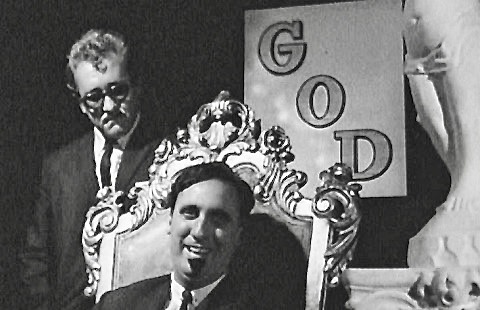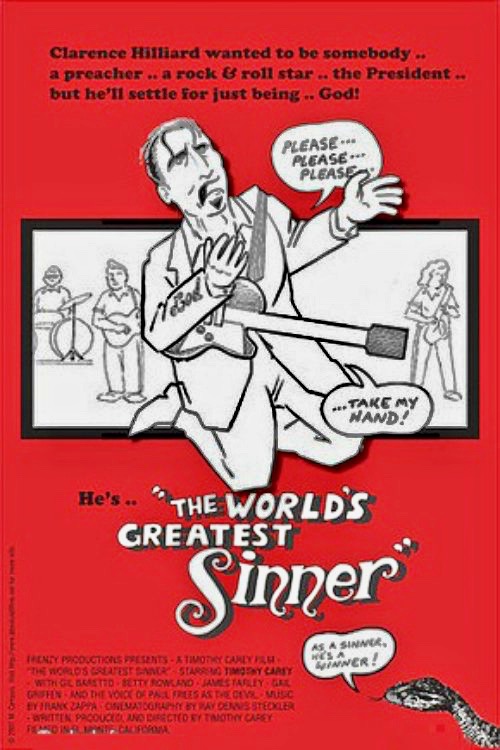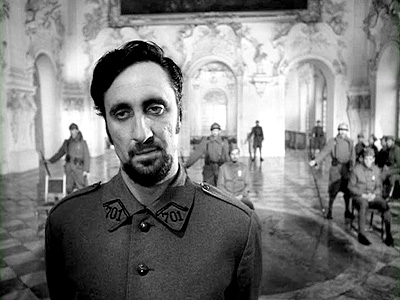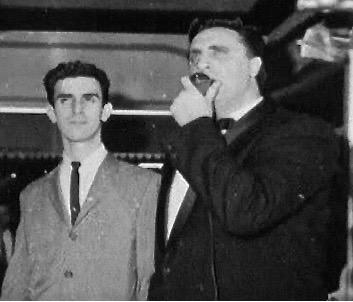
Timothy Carey (on throne) plays a self-proclaimed messiah who starts his own political party in the underground satire, The World’s Greatest Sinner (1962).
You might not know the name but you know the face. One of the most eccentric character actors in American cinema, he has had the rare distinction of working with everyone from James Dean and Elia Kazan (East of Eden) to Marlon Brando (The Wild One; One-Eyed Jacks) to Stanley Kubrick (The Killing; Paths of Glory) to John Cassavetes (Minnie and Moskowitz; The Killing of a Chinese Bookie) to The Monkees (their feature debut Head) to Mr. T, Bill Maher and Gary Busey in D.C. Cab. Let me add a few more to that already impressive filmography which includes appearing with Clark Gable (Across the Wide Missouri), Francis the Talking Mule (Francis in the Navy) and Shelley Winters and Debbie Reynolds (What’s the Matter With Helen?) and god knows who else. We’re talking about Timothy Carey and probably his greatest role is the one you’ve never seen – The World’s Greatest Sinner (1962). 
Written, directed and starring Timothy Carey, The World’s Greatest Sinner truly qualifies as an underground movie in more ways than one. Not only did it never receive an official theatrical release, making it practically impossible to see unless it was at one-off screenings organized by Carey, but the film defies practically every convention of commercial filmmaking, inventing its own film language as it goes along. Is it a Dadaist prank? (Carey was a huge fan of Salvador Dali). Is it an allegory about American culture and society? Is it a Beat Generation rejection of conformity? Or is it some kind of crackpot masterpiece about self-actualization? It’s probably all of the above and then some.

Timothy Carey plays a man who could be crackpot or a genuine visionary in The World’s Greatest Sinner (1962).
Here’s a capsule version of The World’s Greatest Sinner. An insurance agent named Clarence Hilliard suddenly has a revelation at work and discards his nine-to-five existence for streetcorner sermonizing. But he doesn’t preach the gospel. Instead he espouses his own spiritual beliefs after making a pact with the Devil (the voice of Paul Frees in the guise of a snake) – “There’s only one God, and that’s Man.” Soon, he changes his name to God and begins to attract a following of new converts through his live rockabilly performances and impassioned rabble-rousing.

Clarence Hilliard (Timothy Carey) rocks out with his band as he campaigns for President of the U.S. in The World’s Greatest Sinner (1962).
His promise to make everyone a “superhuman being” brings him into the political arena where he runs as an independent for President of the United States. As his power and influence grows, so does his delusion that he is invincible. He seduces 80-year-old women and 14-year-old girls alike in his blatant flaunting of taboos, incites riots, and eventually challenges the real God to a showdown.
As audacious as it sounds, the execution is decidedly un-Hollywood in presentation. The film, featuring a cast of non-professional actors with few exceptions, has a home movie feel to it, with scenes shot in Carey’s home, his neighborhood, in and around Los Angeles and on cheap interior, low-budget sets. 
The sound recording is inferior and some of the dialogue is hard to hear, the cinematography (by Ray Dennis Steckler, director of 1964’s The Incredibly Strange Creatures Who Stopped Living and Became Mixed-Up Zombies) is wildly uneven from poorly lit scenes to an obvious fondness for the odd detail. And the editing is haphazard, resulting in occasional incoherence that is closer to stream-of-consciousness musings than a conventional linear approach to narrative.
The musical segments, in particular, are especially memorable because Carey recruited a young, unknown-at-the-time Frank Zappa to compose the score – and it’s one reason for the movie’s cult fame. Zappa would later dismiss the movie, according to Carey, stating that The World’s Greatest Sinner was “the world’s worst film and all the actors were from skid row.” Those same accusations would later be leveled at the films of John Waters (Pink Flamingos, Multiple Maniacs) which shares so many sensibilities and renegade filmmaking tactics with Carey’s opus.

An insurance salesman has a revelation and starts his own political party in the absurdist comedy, The World’s Greatest Sinner (1962), written by, directed and starring Timothy Carey (pictured).
Of course, the main reason to see The World’s Greatest Sinner is to observe Timothy Carey with the brakes removed. He’s mesmerizing in every scene but subtlety is not his speciality. Some critics have accused him of being a total ham and his scene-chewing has an excessive, bigger-than-life quality. But just try to tear your eyes away from the screen.

Self-proclaimed visionary Clarence Hilliard (Timothy Carey with guitar) prepares to wow his audience and increase his fan base in The World’s Greatest Sinner (1962).
Watch him shake like a bowl of radioactive jello as his Elvis-like alter ego dressed in gold lamé (There’s a little James Brown thrown in as well – “Please! Please! Please! Please! Please! Take My Hand!” – and maybe even some Tiny Tim). See him transform before your eyes into a hell and brimstone evangelist or play it sweet and low-key as an insurance salesman who’s just “seen the light.”

Private Maurice Ferol (Timothy Carey) is condemned to death by firing squad in Stanley Kubrick’s Paths of Glory (1957).
Carey has always had his own “style” of acting and when you start to consider all of the parts he’s played, he stands out in every movie, even in films where a director like Stanley Kubrick tightly controls every detail right down to an actor’s performance. Among some of my favorite Carey performances are his scary whorehouse bouncer in East of Eden, the shell-shocked, emotionally damaged soldier facing execution in Paths of Glory, the creepy gangster assigned to watch over hostage Phyllis Kirk in Andre de Toth’s Crime Wave, one of the hell-raising motorcycle gang members in The Wild One and his racetrack marksman in The Killing. Now you can add God Hilliard in The World’s Greatest Sinner to the list of unforgettable Carey performances.

Homicidal hoodlum Johnny Haslett (Timothy Carey) menaces Ellen Lacey (Phyllis Kirk) in Andre De Toth’s underrated noir Crime Wave (1953).
For years the only way you could see The World’s Greatest Sinner was to purchase a DVD-R copy directly from Absolute Films, a website run by Romeo Carey, son of the actor/director. That site is no longer online but as of May 2013, the film has been made available from Absolute Films on Amazon so that is your only option unless TCM airs it again in the future. The World’s Greatest Sinner was previously showcased on their late night franchise, Underground. This is one movie that sorely needs a remastering and maybe someone will come to the rescue someday like Arrow Films or Kino Lorber. 
Other websites of interest:
https://www.filmcomment.com/article/cracked-actor-timothy-carey/
https://thetimothycareyexperience.com/tag/the-carey-family/
https://www.nj.com/entertainment/tv/2008/10/post_5.html
http://www.shockcinemamagazine.com/sinner.html
https://www.youtube.com/watch?v=egRbQ_ZsToQ

